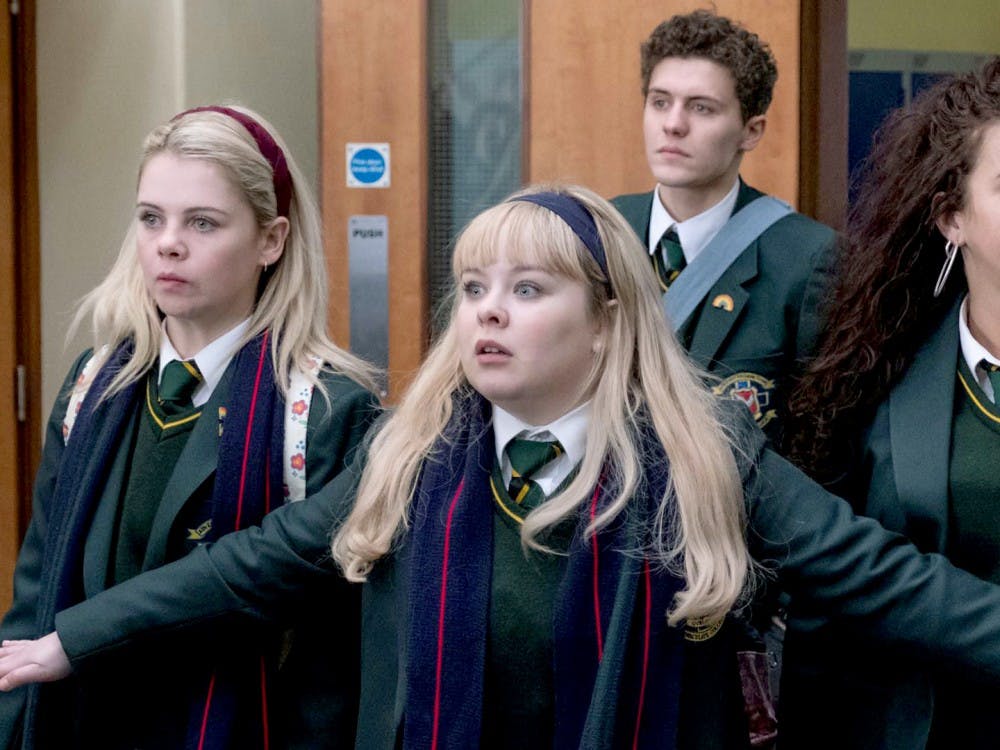When “Derry Girls” first came out in 2018, I immediately binged the first season, enthralled by awkward and absurd lead actors finding themselves in the most ridiculous situations. To me, each half-hour episode captured a unique part of the teenage experience, particularly one wrought with the background violence of war and division.
This April, the newest season of the show was released onto Netflix and only recently, I binged the entire season within a few short days, equally shocked and amused by the incredible characters conceived by Lisa McGee, the show’s creator.
From setting fire to a fish-and-chips shop to nearly destroying the bathroom at a funeral service, the characters of “Derry Girls” continually keep the audience on its toes. Yet, while Saoirse-Monica Jackson’s character Erin and her friends live their normal (yet still somewhat preposterous) teen lives in Northern Ireland during the 1990s, the lasting impacts of the Troubles seem to follow close behind.
The Troubles was a period of violence over the status of Northern Ireland from the late ‘60s to the early ‘90s. The conflict began in Derry, a city in Northern Ireland, during the Battle of the Bogside, following a period of discrimination and violence against Catholics. This bloodshed ended in 1998 with a cold peace, lacking any genuine reconciliation between these two clashing religious groups. The Protestants and Catholics in that region remain divided to this day.
Creator Lisa McGee never intended to write about the Troubles, often finding the topic “grey and masculine,” but when toying with stories about a convent school, she began working with her own memories of the time. She wanted a show that more accurately represented both the fractured violent Troubles with Northern Irish comedy.
Accordingly, while “Derry Girls” does discuss common teen subjects such as fretting over crushes and dealing with strict parents, it is deeply grounded in its setting of Derry and the remains of its violent history. When the characters attempt to sneak a suitcase of vodka onto a bus, it is misinterpreted to be filled with explosive devices. Even the character of Clare (played by Nicola Coughlan) acts as a young activist, continually obsessed with breaking down the divides between the British and the Irish, the Catholics and the Protestants. Thus, with seemingly universal themes of teenhood, such as rebelling against social norms or disregarding rules, the show communicates a much less obvious discussion of division and violence and its impact on communities, making it incredibly relevant for our increasingly fractured United States.
Somehow, this show perfectly balances the seriousness of the time with the humor and awkwardness of growing up, dealing with insecurities, seeking out romantic relationships and preserving strong friendships. And unlike other teen shows, every character is important and well-developed, regardless of the amount of time they spend on-screen. North Irish characters McGee had seen were undeveloped or simply despondent. Appropriately, even the adult characters, rather than being portrayed as inferior to their teenage counterparts, are treated with an equal brush of ridiculousness and chaos. These adults are more than simply the teenager’s perspective of them — they are equally developed and necessary to the tumultuous storylines. From accidentally wearing a white dress to a wedding, nearly upstaging the bride, to attempting to intercept radio signals and hunt down President Bill Clinton, each adult character is as absurd as the next, playfully discussing themes of parental love and sacrifice.
“Derry Girls” is a brilliant comedic portrayal of what it means to be a teen, particularly a teen in Derry, Northern Ireland, at the end of the Troubles. It is raw and realistic, powerful and absurd, political and ridiculous, unlike the vast majority of shows marketed to young adult audiences today. Its characters are equally imperfect and wild, trying to balance teenage self-consciousness and insecurity with their wild antics. And ultimately, it is dangerously addictive — the perfect show for the new school year.
Get The Chronicle straight to your inbox
Signup for our weekly newsletter. Cancel at any time.

